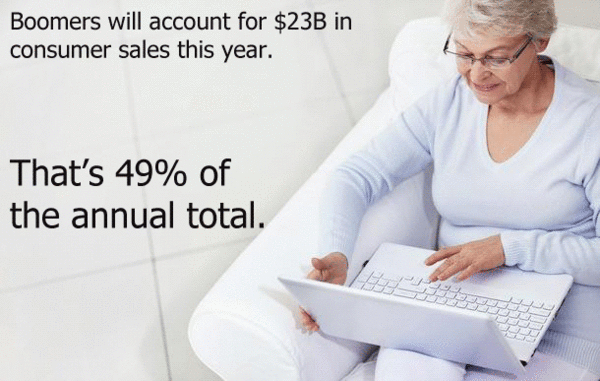
If your image of a computer geek is a scruffy, awkward kid in T-shirt and jeans, you may want to think again. The biggest technology adopters may well be the affluent over-50 powerhouse known as the Baby Boomer.
The Economic Juggernaut
Eighty million Boomers live, work and spend in the United States, nearly a third of the population. If you add the previous generation, the number of 50-plus Americans is 98 million, a segment of the population that’s expected to grow 34% between now and 2030, when nearly half of the nation will be aged 50 or over, according to a recent study from The Nielsen Company.
That is a huge economic force, one that has been shaping the U.S. private sector for a long time. But unlike previous generations, where the members “age out” of active spending and societal influence, the sheer size of the Boomer generation means that it will continue to be a force for a long time to come. By the middle of the 21st century, Nielsen reckons, there could be around 161 million 50-plus citizens in the country.
Already, this is a generation heavily influencing technology, just from it’s buying power. 41% of Apple customers are Boomers, the Nielsen report states.
“From a practical standpoint, new technology helps them stay socially and intellectually connected with their contemporary world. Psychologically, it helps them to validate their self-image of being experiential, progressive and perpetually youthful,” the report stated.
Techno-Boomers’ Online Landscape
It’s not a good idea to plug all Boomers in as ultra-savvy in all things tech. Like their children and grandchildren, they are selective in which elements of technology they like to use. Nielsen paints a picture of “techno-Boomers” — a subset of the senior crowd who are far more likely to own an electronic reader or an iPhone than the rest of their generation, who tend to gravitate toward desktops and laptops.
These techno-Boomers, like their kids in Generation X, are 40% more likely to own an iPhone. Curiously, they are much less likely to have a movie download subscription, something unpopular throughout the entire Boomer generation. (Generation X and Millenials are apparently more apt to plunk down for movies online.)
But Boomers as a whole are online. A lot. Boomers represent a third of all online and social media users. Another third of the generation, 29 million according to Nielsen, are heavy Internet users with 8 million of them spending over 20 hours a week online.
“Internet users over the age of 50 are driving the growth of social networking as their usage of the social net has nearly doubled to 42% in the past year. 53% of Boomers are on Facebook,” Nielsen reported.
Just after the iPad tablet was released in 2010, wave after wave of anecdotes came out about how fast seniors were adopting the new platform so readily. While the iOS interface was designed and built for the smaller iPhone device, it is probably no accident on the part of Apple’s design team to come up with an interface that requires such a small learning curve to operate, making it very marketable for the over-50 crowd.
Just as it has always done, the Boomer generation again represents something new in the U.S. economy. Rather than declining in spending and population as has other generations, Boomers will only continue to grow as Generation X starts to join them in 2015 when the oldest GenXer turns 50.
And right now, even before this growth, Boomers alone are expected to account for nearly $230 billion in sales of consumer packaged goods, or 49% of total sales, this year This buying power indicates the out-sized influence that Boomers will have on consumer-facing technology.
Image Courtesy of Shutterstock

















